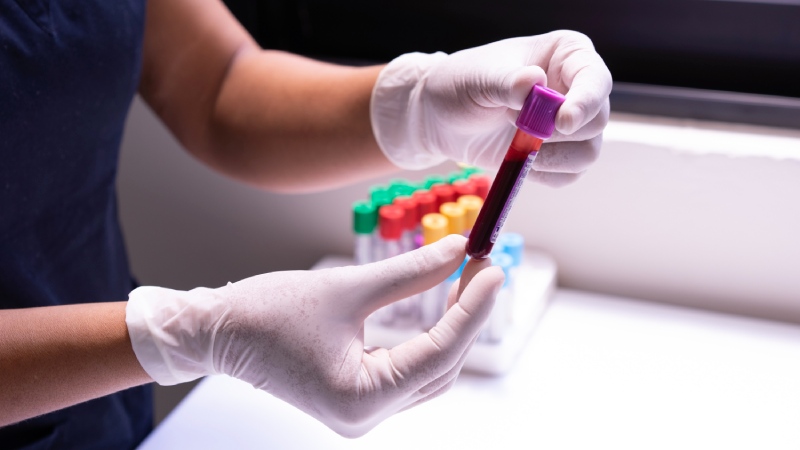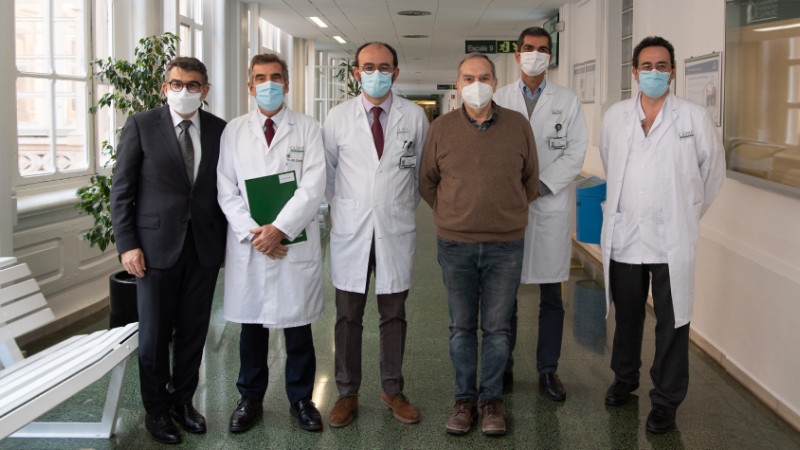-
27 December, 2021
Liquid biopsy shows its utility in the analysis of cancer

One of the big challenges in the treatment of cancer is its heterogeneity. Tumours can present different mutations and change with time, which means that not all treatments are effective or they generate resistance. That’s why it is important to carry out follow-ups that allow us to identify changes as they are produced. However, getting the precise samples to carry out this analysis via a tissue biopsy isn’t always easy. That’s why, in the last few years, a new method has been developed which allows to analyse tumoural DNA circulating in the blood in order to carry out this follow-up and analysis of cancer in an easy and simple way. This is known as liquid biopsy.
-
23 December, 2021
The Hospital Clínic Group develops a second CAR-T, suitable for multiple myeloma resistant to treatment

The Hospital Clínic Group of Barcelona along with the August Pi and Sunyer Biomedical Research Institute (IDIBAPS) have developed a new CAR-T, the ARI-0002h, for patients with multiple myeloma resistant to habitual treatments. The results of a clinical trial, recently presented in the American Society of Hematology (ASH), which was held in Atlanta, have demonstrated that this new CAR-T for multiple myeloma is capable of getting a response rate of up to 75% after a year of treatment and that in 60% of patients that have complete remission and without residual disease, results that are, without doubt, very hopeful.
-
30 November, 2021
Stanford University places 18 professionals from barnaclínic+ among the most influential scientists in the world

How can you evaluate the quality of a researcher’s work? One of the criteria that is most taken into account for this is to evaluate the number of times that other researchers cite them in their articles. Based on this criteria, Stanford University, in the U.S., this last 19th of October published the “World Ranking of Top 2% Scientists”. This list identifies the most influential researchers in the world, whose works have been most cited during their scientific career evaluated between 1996 and 2020 and also during the last year.
-
18 November, 2021
Four professionals at barnaclínic+ are among the best scientists in the world

From the year 2001, Clarivate Analytics has published their ‘Highly Cited Researchers’ ranking. It’s a list which identifies the most influential researchers in the world and to form part of it you must find yourself among the 1% of most cited authors per field and year in the Web of Science. It’s one of the most prestigious classifications among the international academic and scientific community. And on this list of the best scientists in the world 2021 once again there are four professionals at barnaclínic+: Dr. Josep Dalmau, Dr. Ramon Estruch, Dr. Francesc Graus and Dr. Eduard Vieta.
-
3 November, 2021
Seven services of the Clínic among the best in the world in the ‘World’s Best Specialised Hospitals’ from Newsweek magazine

Once again Newsweek magazine has made their ranking of the best hospitals in the world by speciality, the ‘World’s Best Specialised Hospitals’ and the Hospital Clínic Group Barcelona has played an important role in it. The ranking from this year 2022 has for the first time widened the number of specialities analysed from seven to ten, and the Hospital Clínic Group has managed to have some of their services in up to seven of these categories.
-
2 November, 2021
Dr. Antonio de Lacy’s team at Hospital Clínic is a global point of reference in transanal surgery

Surgical techniques are constantly evolving in order to improve the results while minimising the consequences caused by the intervention. One of the routes that is followed to achieve this last step is by reducing, where possible, the incisions employed in order to carry out the intervention. In this regard the approaches that take advantage of the natural orifices of the patient are being used more and more. Transanal total mesorectal excision or TaTME is one of these techniques, developed by the team lead by Dr. Antonio de Lacy, head of the Gastrointestinal Surgery Service at Hospital Clínic of Barcelona and oncology surgeon at barnaclínic+, it is currently considered one of the best treatment options for patients with colon and rectal cancer. Read more…
-
14 September, 2021
The Clínic Eye Training Center is born, a model of excellence in ophthalmological training

The Hospital Clínic group has just put into motion a new project: the Clínic Eye Training Center (CETC). As part of the new Ophthalmological Surgery area, in the Maternity facility, the CETC was made with the aim of creating a model of excellence in ophthalmological training and developing innovation projects at the same time. It’s state-of-the-art training in surgery and it’s the first practical-training project in ophthalmology in a public center in Europe.
-
13 September, 2021
Researches at Hospital Clínic group develop a new tool for diagnosing Foetal Alcohol Spectrum Disorder

Researchers at the GRIE (Infancy and Environment Research Group) at Hospital Clínic-IDIBAPS, collaborators with the Neurodevelopmental Disorder Unit at barnaclínic+, have developed VisualTEAF, an app that, thanks to artificial intelligence, is able to help in the diagnosis of Foetal Alcohol Spectrum Disorder (FASD). It’s the first diagnostic tool for FASD in which machine learning is used, a branch of artificial intelligence that allows machines to learn without being expressly programmed to do so.
-
30 August, 2021
The Hospital Clínic group incorporates disposable duodenoscopes in order to reduce the risk of in-hospital infections
One of the main concerns in a hospital environment is avoiding nosocomial infections, ones which are contracted during a stay in a hospital and are usually caused by multidrug-resistant bacteria. During the COVID-19 pandemic, preventing infections of this type gained even more importance to, somehow, slow the spread of the disease. One of the possible sources of infection is when instruments that are difficult to disinfect are used on multiple patients.
“The endoscopes are made up of complex mechanisms that are difficult to disinfect 100%, this means that the complete sterilisation of these instruments is not always achieved”, explains Dr. Andrés Cárdenas, consultant at the Instituto Clínico de Enfermedades Digestivas y Metabólicas del Hospital Clínic (Clinical Institute of Digestive and Metabolic Disease of Hospital Clínic) and specialist at barnaclínic+. This is why, at Hospital Clínic group we’ve started using disposable duodenoscopes, a type of endoscope that’s longer in length and, due to its special characteristics, particularly complicated to effectively sterilise.
-
23 July, 2021
What safety measures have we taken for COVID-19?
At barnaclínic+, the health and safety of our patients and staff is the most important thing. To protect both you and ourselves, and thanks to the experience acquired by the centre in the management of the Coronavirus SARS-CoV-2, we have clearly defined hygiene and protection protocols based on the scientific evidence available. In accordance with these, we have put in place the corresponding safety measures for COVID-19.

Pedir cita
Calle Villarroel, 170
08036 Barcelona










